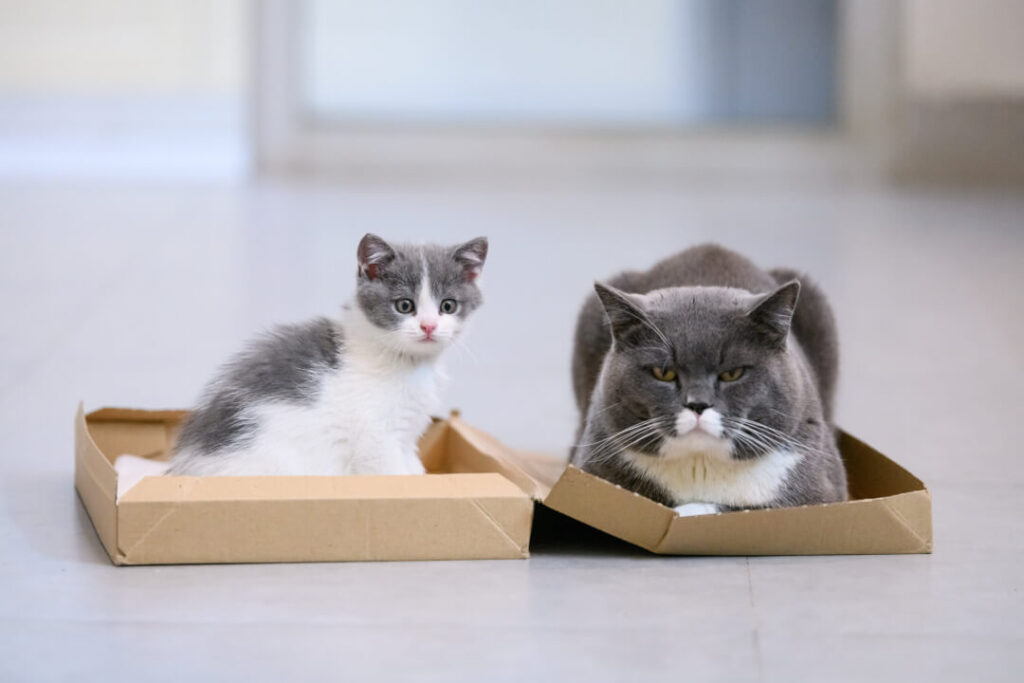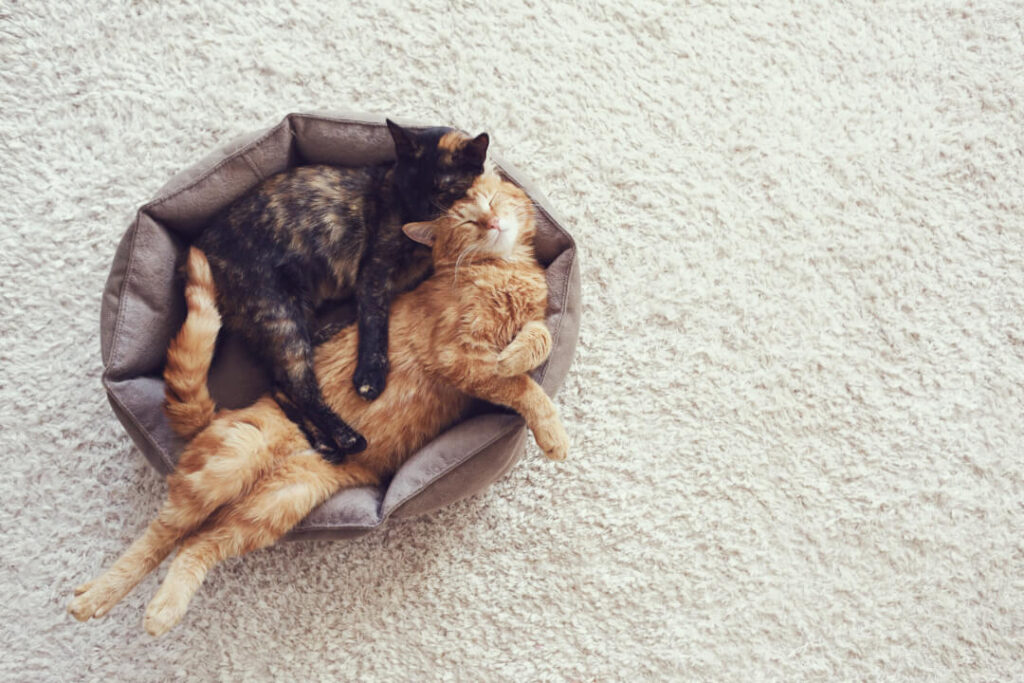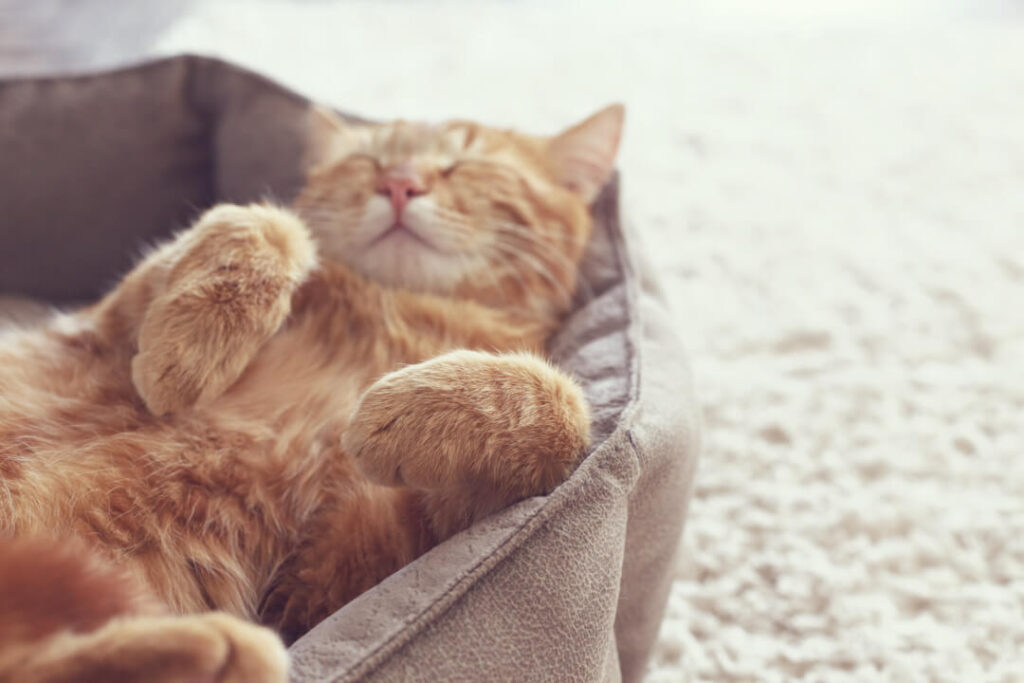You can purchase practically anything on the basis of a spontaneous decision.
But not a companion animal!
So you’ve been wishing you had a cat for some time, and are seriously thinking of getting one? And you’re finally contemplating actually taking steps in this direction? Then you really need to be aware, first of all, that when you acquire a cat, a cat is for life (almost) and not just for Christmas! – after all, cats can live to an age of more than twenty years.
Apart from this, you would like to do your very best to meet the natural needs of your domestic tiger – so what do their basic needs really amount to? What does your future cat really need, in order to be happy with you in every way?
Tips for further cat related topics are listed below:
The cat’s nature
Do you want a male cat of independent spirit? Or a cuddly female lap-cat?
Either male or female cats may be totally cuddly, as a matter of intrinsic character, or else free-spirited and independent… .
And there’s no way of finding out in advance. It’s more likely to be the costs which decides on the gender of your future cat, – spaying a female on average costs less than the castration of a tom.In either case, it absolutely must be done, as you don’t want to see unlimited feline propagation.
Unless of course you are intending to breed cats. But in view of the many stray cats who are already urgently in need of a loving home, you should really have a good think about this!
Deciding for a rescue cat
Getting a cat from the shelter
There are hundreds of cats of all ages desperately looking for a permanent home:
Stray cats, that have been picked-up, countless progeny, cats abandoned during a separation or after their households have broken up – all these are to be found in your local shelter, and they may include pedigree cats as well! You are really doing a good deed if you make this your first choice, to find your ideal new companion animal. It must be said, though, that you need a whole lot of empathy and patience for a cat from an animal rescue home, as it may well have suffered a trauma in its former life, and it may take a while before it can learn to trust humans again.
Tip 1: if you are considering getting a cat from the shelter, it’s useful to visit it several times first, and also to observe it at different times of day. This way you can find out a bit more about its character and preferences, which in turn might help you to better adjust to it.
Do you want a mature cat or a kitten?

A grown-up cat will be less work from the start, as it is already to some extent ‘up and running’, it can do stuff and knows how to do it. Kittens, on the other hand, become independent at an early stage, and pick up a lot from their mothers, but just like human babies they still need to learn everything from scratch – including how to use the litter tray.
Moreover, kittens are naturally more sensitive and more prone to disease. And when they reach a certain age, they need to be spayed or castrated – when the cat is fully grown-up, the previous owner will already have dealt with this.
Tip 2: the younger the cat, the higher the ‘starting capital’ – and you will need all the more time for getting the cat used to your home, and having it learn the basic rules of hygiene.
When can you separate a baby cat from its mother?
A Finnish study of more than 5700 cats of a wide range of breeds came to the following conclusion: baby cats who had been taken from their mothers before the eighth week of life were definitely more aggressive, in relation to new members of the household, than animals which had been left with their mothers for 12-13 weeks. Animals that had only been weaned after 14-15 weeks proved to be more tractable, had better appetites and also were free from undesirable symptoms like compulsive licking and grooming.
In short, those cats showed very much the best development who had been allowed to live with their mothers till they were quite old, or had not been separated from the mother at all.
– It almost sounds as if there might be parallels here with human development, don’t you think?
Checklist before you acquire a cat
- Do you have enough time to look after a pet? Or are you always away from home? A cat needs a lot of time and affection, especially when it lives exclusively indoors. The great majority of cats dislike changes, and prefer rituals and regularity.
- Have you got enough space? A cat needs its own space – and ideally, a large outdoor area to explore as well.
- The cost factor – can you afford the cat food, cat litter, accessories and visits to the vet? Above all the last can run up a considerable bill, especially if the cat suffers from a chronic condition.
- Does the cat’s character suit you? Observe the cat, if possible, at different times of day, before you decide. If you like a bit of peace, a wild exuberant animal may not be the best choice for you. There are cats and cats – their natures vary just as much as is the case with people!
- Timid and extremely withdrawn behaviour is sadly quite common in rescue cats, but with growing trust and confidence this can actually flip over into the opposite: especially cats who have been through a lot in the past may become exceptionally attached.
- If you can’t manage to find your ‘dream cat’ at the shelter, then only buy one from a properly serious and certified breeder – or else give a new home to a stray cat – he’ll be really grateful!
Tip 3: if you’re living in rented accommodation, you absolutely must check with your landlord to see if he is all right with you getting a cat. In some cases, if you are in an apartment block, you may have to get the approval of other residents.
Tip 4: try to get as much information as possible about the earlier life of the cat you are interested in. This puts you in the best position to judge whether you and the cat are really and truly going to hit it off.
How do you recognise a good cat breeder?
- A good breeder keeps the animals in his apartment or home, and they have contact with the family.
- Cats should only reproduce once a year. By careful questioning you can find out if the breeder observes this rule.
- Of course the breeder must know everything about the breed and the needs of his cats, and give you comprehensive information voluntarily.
- Membership in a cat breeder association is an indication, but unfortunately never a hundred percent guarantee of a breeder’s seriousness.
- You would do well to steer clear of kittens that are (supposedly) going at a specially low price!
- Ideally, when buying a pedigree cat you should be issued with its family tree document, and ensure that the register of owners will be updated following the purchase.
- In the case of long haired cats, the cats should already be used to the grooming routine.
Sad to say, those who sell cats include some ‘black sheep’ who pretend to be breeders, but just allow animals to multiply irresponsibly. So you should be extremely careful about choosing a breeder to go to!
Should cats be kept alone or not?
Cats start to become socialised from the fourth week of their lives. In most cases this involves their siblings (‘single children’ are a rarity in cat families). During this period they find out everything about pussy cat interaction, and this way they are brought up not just by their mother but by their siblings.
If a cat grows up under these circumstances and in a species-appropriate way, it will be a “solitary hunter” all its life; but only in exceptional cases does it become a “solitary animal”, because cats are very gregarious by nature.
Cats love cats
This being the case, if you want to keep a cat indoors, you would do best to offer two cats a home together – because it has to be admitted that a human being can never replace another cat completely. Whatever lengths you go through, you can never satisfy the need for closeness and entertainment in quite the same way as a member of the same species. But of course this is OK – you are a human- being after all, and don’t have to mutate into a cat just to make your puss cat happy!
When several cats are kept in your apartment together, they will provide mutual fun and games. And the unpleasant concomitant phenomena that can result from isolation – like lack of hygiene, and other forms of inappropriate behaviour – will not occur at all.
It’s a different matter with cats who are allowed to go outdoors. Outdoor cats have enough adventures in the wild, and are also going to come across other furry friends.
What kind of cats go well together?

Ideal geeignet sind naturgemäß Geschwister – hier ist die Chance auf eine innige Katzenfreundschaft am größten. Prima klappt es auch, wenn Du einer älteren Katze eine wesentliche jüngere hinzugesellst.
Denn die Kleine genießt erst einmal Narrenfreiheit.
The benefits of keeping two cats
Two cats reduce the stress that a bored cat gives you when it scratches the furniture, or gears up to other kinds of mischief. Vet’s bills will be reduced with additional cats as well, since cats living together are much less prone to illness.
If you use a top-quality plant-based cat litter like Cat’s Best, though, the work is manageable. Pure plant-based cat litter makes use of technologically refined active wood fibres, which absorb moisture and odours immediately and lock them away. This is why you can leave Cat’s Best for as long as seven weeks in the litter tray before you have to change it completely.
Things you need to get for your cat
To keep the new member of your household happy on the physical and emotional level, you must provide the right sort of equipment.
- For indoor cats, you will need a cat tree with scratching posts. There is an almost unlimited choice available on the market. The range extends from stylish, expensive designer furnishings to homemade creations made of natural wood. The important thing is to give your cat plenty of opportunity to sharpen its claws.
- Even playful bundles of energy need a rest from time to time, and for this they will need a cosy place where they can withdraw – ideally a plush cave or a favourite cushion: a cosy retreat, in other words, where your cat will really enjoy taking a nap.
- Indoor cats in particular enjoy drinking from fountains and eating cat grass. This ensures that they get enough liquid and natural vitamins.
- As cats are cave-dwelling animals, a simple cardboard box (even if it doesn’t come from a reputed online dealer) can stimulate cats and get them incredibly excited. Just cut a few holes in it of different sizes, put a lid on the top – and the fun begins!
- Another indispensable accessory is a carrier cage. Plastic carriers with a lid that opens and closes on top are highly suitable, so you can lower the cat into the box comfortably and without stress. It’s a good idea to put a familiar comfort blanket inside. You should get your cat used to the carrier right from the start, as sometimes an urgent visit to the vet may be required.
- If an indoor cat makes excursions onto the balcony, this should be provided with suitable cat netting, so the cat can’t get away or fall. If you want to set up this kind of netting, though, you may have to ask your landlord for permission.
- If you have an outdoor cat living in your home, but are not able always to open the door in person, you would be well advised to install a cat flap. To prevent a situation where all the cats in the neighbourhood come round to party, you can now get cat flaps that are fitted with an individual chip and so will only allow your own microchipped cat to pass.
- Cat’s toys are particularly important for indoor cats, because they lack the stimulating experiences that outdoor cats get when they are roaming around outside. For the same reason, purely indoor cats are more geared to people and on the whole more attached, but they also depend on additional entertainment.
- Depending on the cat’s fur, there are various grooming tools available: combs with special tines, brushes, trimming knives and even hair balm to make combing easier. Grooming your cat’s fur is not just a pleasure, it is mandatory – especially with long haired cats, semi long haired cats and elderly animals who are no longer flexible enough to get at every spot when they clean themselves.
Tip 5: if you want your cat to stay fit and healthy, be very conscious of hygiene. Remove soiling from the litter tray every day, and change the litter completely on a regular basis. Ensure that food and water bowls are always kept clean.
Tip 6: it is very easy to make cat toys yourself. You’ll find lots of fabulous suggestions on how to do this online. It’s environmentally friendlier and a whole lot of fun!
Living with cats
Living with a cat (or cats) will give you many wonderful moments, because cats have an irresistible way of attracting the attention of their care-takers. It’s no accident that people talk about cat owners as being ‘tin openers’ or ‘door openers’. It is actually rather magical the way cats succeed in training ‘their’ people – and they’ve been doing it for hundreds of years!
But actually it’s not so surprising: the human-feline (or should I rather say, feline-human) constellation is simply perfect! The cat enjoys the care you give it, and for you it is a fabulous feeling when this wild animal has so much confidence in you and trusts you so completely that it lies on its back or side (actually a defensive position) and invites you to stroke it. And what is more, it has been scientifically proven to be relaxing, when you stroke a purring cat.
It’s less relaxing, of course, when a cat suddenly develops oddities. And it’s actually very unpleasant when the cat ceases to be ‘clean’. There can be many causes for this, which is why we have specially compiled our Cat’s Best Feline Hygiene Tips – these will give you plenty of advice and suggestions on the subject.
Tip 7: before you even acquire your cat, you should choose a vet. Compare the costs of inoculation, worming and other treatments. Look at the online reviews of the practice, or ask other cat people who they would actually recommend. And it’s just as important to think who is going to look after the cat if you yourself are away on holiday, or sick, and so not in a position to see to your cat’s needs.
Cats like it quite
Basically your cat favours a carefully maintained, peaceful environment. Cats love rituals and a regular daily programme – regular feeding times, a litter tray kept in the same place and emptied at the same time every day. Most pussy-paws react sensitively to variations from the norm. Rearrangement of the furniture, a completely new apartment, new animals or humans in the home, a different rhythm of life – all these things can disturb a cat to a greater or lesser degree.
But all cats find the following things extremely unpleasant: cigarette smoke, loud music, voices raised in anger, an unhygienic litter tray and the lack of a place to retreat to.

Getting a cat – the essentials
As Loriot – alias Vicco von Bülow – so pertinently remarked about his favourite dog breed: ‘A life without a puppy is possible, but pointless.’ This can equally well be applied to cats!
Admittingly, life with a new partner does harbour certain risks, and you may even have to make sacrifices – but at the same time, your life will become so much richer:
Your animal companion has just chosen to embellish your curtains with a snazzy fringe – and the very next moment, it jumps onto your lap, purring, and gently nuzzles your wrinkled brow with its head – I swear, you don’t have a chance!
